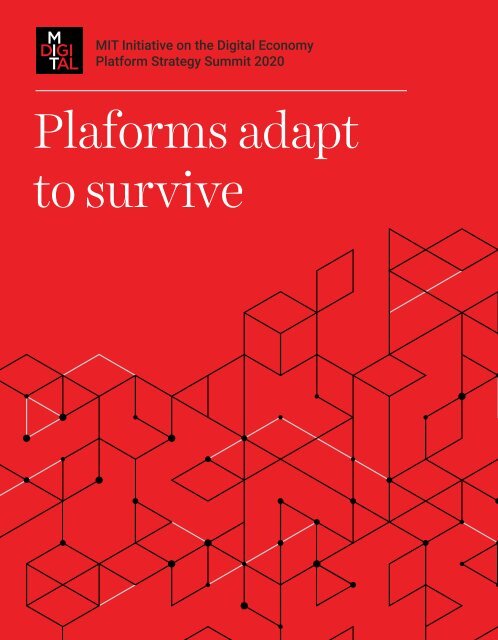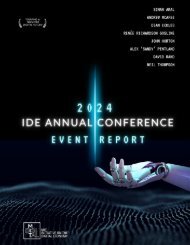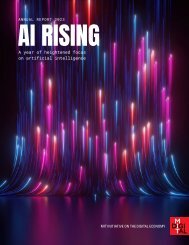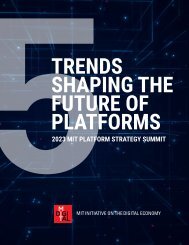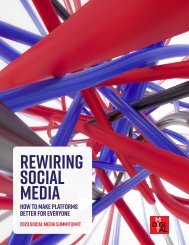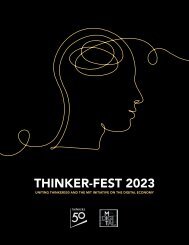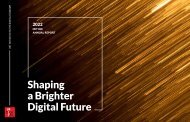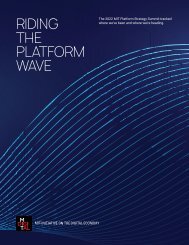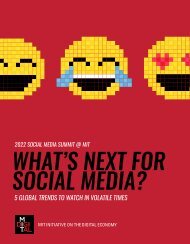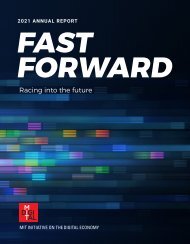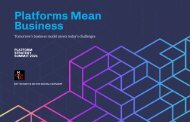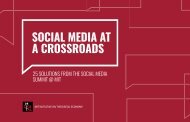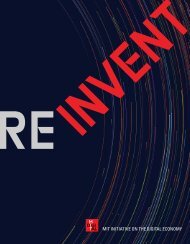2020 MIT Platform Report
You also want an ePaper? Increase the reach of your titles
YUMPU automatically turns print PDFs into web optimized ePapers that Google loves.
<strong>MIT</strong> Initiative on the Digital Economy<br />
<strong>Platform</strong> Strategy Summit <strong>2020</strong><br />
Plaforms adapt<br />
to survive
2 / <strong>MIT</strong> IDE <strong>Platform</strong> Strategy Summit <strong>2020</strong><br />
Put to the test<br />
In <strong>2020</strong>, the resolve of platform markets—like every other<br />
business sector—is being tested in real time.<br />
03 Overview<br />
04 Siemens assembles a platform future<br />
05 The super-app economy<br />
06 Telemedicine takes a giant leap ahead<br />
07 Ping An’s evolution from finance to platforms<br />
08 Despite the pandemic, the show must go on<br />
09 Tales from a platform pioneer<br />
10 Action items<br />
Digital platforms:<br />
It’s how business operates<br />
in <strong>2020</strong><br />
From Uber rides to Grubhub food delivery,<br />
Spotify entertainment to online healthcare,<br />
digital marketplaces are increasingly<br />
offering new products, services, and<br />
networking.<br />
Nevertheless, the current economic crisis<br />
is testing the resiliency and mettle of these<br />
innovators like never before. Since the<br />
COVID-19 pandemic—and the resulting<br />
economic nosedive—platform models are<br />
being tested.<br />
The question is: Can disruptors like Airbnb<br />
pivot as quickly as they began? Which<br />
platforms will grow and which may fail?<br />
Is this the time for traditional industries to<br />
<strong>MIT</strong> IDE <strong>Platform</strong> Strategy<br />
Summit <strong>2020</strong>: Where we’re at<br />
and what’s ahead<br />
At the <strong>2020</strong> <strong>MIT</strong> IDE <strong>Platform</strong> Strategy<br />
Summit in July, emerging and incumbent<br />
platform leaders discussed their strategies.<br />
The day-long Summit, with more than 900<br />
virtual attendees, featured experts from<br />
several fields and industries.<br />
“We’re living in a platform economy,” said<br />
Peter Evans, manager partner at the <strong>Platform</strong><br />
Strategy Institute and a conference co-chair.<br />
“But digital markets are also volatile and<br />
tremendous challenges loom.”<br />
Evans noted that an onslaught of new models<br />
are emerging due to the pandemic. “We’re<br />
moving from obvious to more complex<br />
ecosystems, where multiple platforms merge<br />
Key takeaways<br />
1<br />
<strong>Platform</strong>s will become more resilient,<br />
especially compared to incumbent firms,<br />
because of their ecosystem design and<br />
network effects.<br />
2<br />
When production takes place largely<br />
outside of the firm (the “inverted firm”),<br />
the business is adept at working with a<br />
diverse set of changing partners.<br />
3<br />
The agility advantage allows platforms<br />
to more swiftly switch to new partners<br />
and new customers, when the need arises.<br />
View videos of the <strong>2020</strong> <strong>MIT</strong><br />
IDE <strong>Platform</strong> Strategy Summit<br />
As platform business<br />
models—and the technology<br />
stacks needed to run them—<br />
become widely understood<br />
and available, talent has<br />
become the next frontier of<br />
the platform economy.<br />
ramp up their platform capabilities?<br />
into one. It’s exciting, but you must know how<br />
to lean into platforms to create new value to<br />
old products and services.”
3 / Overview<br />
A bird’s-eye view<br />
Summit co-chairs analyzed platform market trends<br />
unfolding in a chaotic environment.<br />
Recalibrating supply and demand<br />
The rise of platform professionals<br />
<strong>Platform</strong> vs federated platform vs<br />
product on a platform<br />
Market<br />
transform?<br />
Resources<br />
to tip<br />
market?<br />
Control<br />
customer<br />
relationship?<br />
Product/service<br />
Coalition<br />
resources<br />
to control market?<br />
Federated platform<br />
Product/<br />
service<br />
on platform<br />
“We’ve seen both precipitous demand drops as well as explosions in<br />
platform markets,” said Geoffrey Parker.<br />
Among those riding the wave are Amazon, which is experiencing<br />
market cap gains in the range of $400 billion and Zoom, which posted<br />
a revenue increase of 355 percent in the second quarter of <strong>2020</strong>.<br />
“We’ve also seen huge disruptions in the finance and energy sectors<br />
where market losses have been up to $130 billion,” he said. In-person<br />
dining at U.S. restaurants has shriveled, and ride-sharing platforms<br />
experienced immediate declines when lockdowns were ordered.<br />
“The pandemic clearly has had different impacts across sectors.”<br />
On the supply side, winning firms made end-to-end digital connections<br />
that allowed them to quickly pivot to meet new customer demands.<br />
“The business model is how you realize revenue, and the operating<br />
model is how you deliver value,” said Parker. “These need to be correctly<br />
matched to one another.”<br />
Geoffrey Parker<br />
Professor, Dartmouth<br />
<strong>MIT</strong> IDE Digital Fellow<br />
<strong>Platform</strong> Strategy Summit Co-Chair<br />
Three common responses to the COVID-driven crisis<br />
Weather the storm<br />
Go into resourceconservation<br />
mode<br />
Rapidly pivot<br />
Take assets into<br />
other markets<br />
Ride the wave<br />
Demand explodes,<br />
hang on for dear life<br />
Peter Evans forecasts high demand for platform talent and the rise<br />
of platform professionals during the pandemic. “A key component to<br />
successfully launching and running platforms is the talent you bring to<br />
execute on those strategies,” he said.<br />
The key roles that firms are seeking to fill include platform strategists,<br />
product management, ecosystem managers, engineers, data managers,<br />
and privacy and compliance experts.<br />
“Applicants need deep technical expertise, but also broad<br />
competencies,” Evans said. “It’s extremely difficult to find one person<br />
that can meet all these capabilities.”<br />
A significant question—especially for larger companies on the hunt for<br />
platform professionals—is whether to groom from within or recruit from<br />
outside. For example, Nike recently hired a seasoned platform executive,<br />
former CEO of eBay, as its new CEO.<br />
Peter Evans<br />
Managing Partner, <strong>Platform</strong> Strategy Institute<br />
<strong>Platform</strong> Strategy Summit Co-Chair<br />
Demand for platform talent during the COVID-19 pandemic<br />
Replenishers<br />
Companies trying<br />
to meet demand or<br />
replace employees<br />
lost through attrition<br />
Builders & startups<br />
Companies hiring<br />
to build their<br />
workforce<br />
Incumbents<br />
Legacy companies<br />
that need talent<br />
to drive platform<br />
strategies<br />
Firms will need to design organizational structures and functions so<br />
that platform capabilities, including strategy, project management, and<br />
ecosystem management, become embedded in the organization.<br />
<strong>Platform</strong><br />
To platform, or not to platform<br />
Marshall Van Alstyne explained when it makes sense to become a<br />
platform and when to be a product on someone else’s platform.<br />
When a market is evolving to a platform, a firm must consider whether<br />
it has the resources to tip the market and whether it can control the<br />
relationship with the customer. If not, it may need to partner to offer a<br />
jointly controlled or federated platform.<br />
Van Alstyne also presented research introducing the notion of “intertemporal”<br />
network effects, or the value that users create for other users<br />
that lasts through time.<br />
This model helps explain the success of firms like the Chinese shopping<br />
platform, Meituan, versus the relative lack of success of Groupon in<br />
the U.S. “Despite having identical business structures and the fact that<br />
Groupon had a two-year head start, Meituan designed network effects<br />
that kept interactions on-platform and created more spillover value,”<br />
Van Alstyne said.<br />
Marshall Van Alstyne<br />
Professor, Boston University and Visiting Scholar,<br />
<strong>MIT</strong> Initiative on the Digital Economy<br />
<strong>Platform</strong> Strategy Summit Co-Chair<br />
Drawing on principles of information economics, van Altsyne presented<br />
new research on how social media platforms can reduce the lies in<br />
political advertising. Read the report.
4 / Keynote: Manufacturing Perspective<br />
Siemens assembles a<br />
platform future<br />
Siemens AG is among a group of industry leaders that<br />
is actively pursuing platform projects.<br />
Dr. Roland Busch<br />
Deputy Chief Executive Officer and CTO, Siemens<br />
Siemen’s Railigent platform uses sensors to monitor trains within its ecosystem.<br />
While most of the splashy headlines<br />
about platform firms involve digital<br />
native players, much is brewing behind<br />
the scenes at traditional firms.<br />
Siemens AG, the German-based<br />
industrial company with a revenue of<br />
$86 billion worldwide and a workforce<br />
of 385,000 employees, is among a<br />
group of industry leaders that is<br />
initiating several platform projects.<br />
Dr. Roland Busch, CTO and deputy CEO<br />
at Siemens, explained how the company<br />
combines the physical and the digital<br />
worlds, and how platform strategies<br />
are being integrated. “We are preparing<br />
software be decoupled, industries<br />
will change from linear to networked<br />
value chains.”<br />
Busch also oversees Siemens‘ venture<br />
capital arm, Next47, which is involved<br />
in artificial intelligence, cybersecurity,<br />
carbon neutrality initiatives, and Internet<br />
of Things (IoT).<br />
The market for IoT is expected to<br />
reach $11 trillion by 2025, according to<br />
forecasts, and Busch said B2B would be<br />
70 percent of that. The potential of B2B<br />
platforms, therefore, could exceed B2C<br />
offerings by then.<br />
is already monitoring and connecting<br />
railroad sensor data to measure their<br />
activity and status. Railigent is a<br />
software-as-a-service platform that will<br />
soon bring competitors and suppliers<br />
into the ecosystem for mutual benefits<br />
and value.<br />
“We can predict as far out as 10 days<br />
which door in a train is going to fail and<br />
why,” said Busch. “This gives us the<br />
opportunity to run our assets with 100<br />
percent availability and to detect failures<br />
before they occur.”<br />
Another example is Mendix, a no-code/<br />
low-code application development<br />
resources than traditional approaches.<br />
The platform has grown to more than<br />
750 customers across 25 industries,<br />
universities, and developers.<br />
<strong>Platform</strong>s are nonlinear, they’re<br />
networked, and the highest value lies<br />
outside the firm, said Busch. “We have<br />
to train people on platform ecosystems.<br />
We all have to relearn business models<br />
and revamp our culture.”<br />
“This is how an inverted company<br />
operates, and we have to learn that<br />
lesson. It’s not in the current DNA of<br />
our managers. If we really want to<br />
The industrial<br />
Internet of Things<br />
will unleash the<br />
next era of growth<br />
and innovation<br />
by combining the<br />
physical and the<br />
digital worlds.<br />
for the disruptive changes of Industry<br />
4.0,” he said. “Not only will hardware and<br />
Railigent, Siemens’ open platform<br />
B2B ecosystem for rail applications,<br />
platform that can build applications up<br />
to 10 times faster with 70 percent fewer<br />
play in the platform game, we have to<br />
understand the mechanisms behind it.”<br />
Dr. Roland Busch<br />
Siemens AG
5 / Developing Markets<br />
As general partner at Andreessen<br />
now provides access to street<br />
event platforms, including Run the<br />
The super-app<br />
Horowitz, Connie Chan studies<br />
developing markets to identify<br />
vendors, food delivery, and news<br />
companies—all from one screen.<br />
World, a venture that Andreessen<br />
Horowitz has a stake in.<br />
economy<br />
Super apps—or apps that combine several mobile<br />
platform investment opportunities.<br />
The venture capitalist predicts that<br />
mobile ‘super apps’ will find their<br />
way to Western markets within<br />
the next five years—and perhaps<br />
become as ubiquitous as in China.<br />
Chan maintains that the rise of<br />
single sign-on, frictionless apps<br />
is inevitable. The goal for<br />
businesses is to use low-margin—<br />
but high frequency or long-term<br />
user experiences—as a way to<br />
“Run the World will bring likeminded<br />
people together online,”<br />
said Chan. “Participants can learn<br />
from experts and connect in a way<br />
that feels natural, safe, and fun,<br />
while maintaining professional<br />
experiences—will soon be the new norm.<br />
Connie Chan<br />
General Partner, Andreessen Horowitz<br />
“China is not only a mobile-first<br />
society, but really a ‘mobile-only’<br />
society,” said Chan. “Apps are<br />
accepted more easily there.” She<br />
expects these apps to spread<br />
widely, especially as mobile-only<br />
users become the norm.<br />
generate leads for new, highmargin<br />
user engagement.<br />
The mobile and online payment<br />
platform Alipay offers services that<br />
may appear unconnected, such<br />
as fund transfer and third-party<br />
services. Yet the app allows users<br />
and personal connections.”<br />
She noted that online<br />
conferences are indispensable<br />
and that it’s critical to emulate<br />
side conversations and build<br />
relationships for those with<br />
common interests.<br />
Connie Chan doesn’t anticipate that<br />
privacy concerns will restrict growth.<br />
Chan noted that the rise of super<br />
apps like WeChat, which combine<br />
several mobile services for a more<br />
streamlined user experience, will<br />
burgeon globally. WeChat started as<br />
a consumer messaging app that<br />
to seamlessly access municipal<br />
services, pay utilities, buy movie<br />
tickets, or book a hotel room. As<br />
a payment platform, it can scan<br />
a barcode instead of requiring<br />
separate order and pay functions.<br />
Chan is also bullish on new<br />
All of these technologies depend<br />
on robust data banks to boost their<br />
impact and to help personalize<br />
user experiences, but Chan doesn’t<br />
anticipate that privacy concerns will<br />
restrict growth. She predicts users<br />
in the U.S. will adopt the apps as<br />
opportunities for online social and<br />
long as they offer significant user<br />
value and convenience.
6 / Healthcare<br />
Telemedicine takes<br />
a giant leap ahead<br />
The COVID-19 pandemic is forcing the healthcare<br />
industry to embrace virtual care.<br />
John Halamka, M.D.<br />
President, Mayo Clinic <strong>Platform</strong><br />
New professional roles may be needed to help patients navigate online technologies.<br />
Healthcare is a prime example of a traditional<br />
that nearly 40 years of halting efforts in<br />
same outcomes at lower costs and with<br />
sector experiencing major platform strides<br />
telemedicine were condensed into 12 weeks.<br />
greater ease of use for patients.”<br />
during the COVID-19 pandemic.<br />
“Once doctors could no longer have on-<br />
Patients who experience barriers to<br />
Most notably, virtual care and in-home patient<br />
monitoring have soared in popularity due to<br />
social distancing measures.<br />
The pandemic has also prompted longstanding<br />
medical regulatory constraints to<br />
loosen, insurance reimbursement formulas<br />
to change, and stubborn restrictions to be<br />
lifted around the country. Developments<br />
like these were not expected to be widely<br />
available for at least another decade<br />
premise visits, everything was possible,” he<br />
said. “From asynchronous consultations,<br />
to acute home care using sensors and AI,<br />
the Mayo Clinic can monitor COPD, kidney<br />
function, and heart failure in homes, as well<br />
as offer nursing and wound care.”<br />
This platform of virtual care is the new<br />
normal as federal agencies and policymakers<br />
have had no other choice than to accept<br />
the changes.<br />
technology, or those who are not tech-savvy<br />
may experience obstacles with virtual care.<br />
Halamka suggests a new occupation—the<br />
equivalent of what he calls a “care traffic<br />
controller”—to help patients navigate the new<br />
healthcare options. These professionals could<br />
help with tasks such as computer access and<br />
monitoring at home or suggest public kiosk<br />
locations where telemedicine is available.<br />
New healthcare models will require new<br />
We experienced nearly<br />
40 years of halting<br />
efforts in telemedicine<br />
condensed into 12 weeks.<br />
John Halamka<br />
Mayo Clinic <strong>Platform</strong><br />
The Mayo Clinic, a 150-year-old national<br />
Consumers will opt for convenience over<br />
human roles and adjustments, and Halamka<br />
nonprofit medical center, is part of the<br />
privacy and high-touch because the gains<br />
admits that there will be stumbling blocks and<br />
telehealth surge. John Halamka, M.D.,<br />
from telemedicine far outweigh any losses<br />
failures along the way. But the long-awaited<br />
president of the Mayo Clinic <strong>Platform</strong>, said<br />
in personal contact. “You will usually get the<br />
transition will be worth it.
7 / Open Ecosystems<br />
Ping An’s evolution<br />
from finance to platforms<br />
Insurance group expands into B2C and B2B<br />
markets—both online and offline.<br />
Jessica Tan<br />
Group Co-CEO, Ping An Group<br />
In some cases, platform leaders entered<br />
“Think of Ping An as a hub and spoke type of<br />
The challenge of being<br />
their market indirectly. Jessica Tan, co-CEO,<br />
model consisting of 10 technology companies<br />
in so many markets lies in<br />
chief operations officer, and chief information<br />
in various markets,” Tan said. In each market,<br />
the complexity, scale, and<br />
officer of the Ping An Insurance Group of<br />
the company has its own B2C flagship, which<br />
diversity of Ping An’s users.<br />
China, explained how her company leveraged<br />
includes Good Doctor and Autohome, the<br />
“Our users come to us for<br />
its financial services expertise to build out<br />
larger ecosystems.<br />
Many Americans might be familiar with<br />
the Chinese platforms, Alibaba and Tencent,<br />
which began as internet providers that grew<br />
their ecosystems around consumers.<br />
By contrast, Ping An was a financial services<br />
firm that used its finance and technology<br />
expertise to foster open ecosystems.<br />
The company serves approximately 564<br />
million users in China across five verticals—<br />
financial services, healthcare, cars, housing,<br />
largest health and car portals in China. “More<br />
importantly, we have a B2B franchise,” she<br />
added. “We believe online and the offline<br />
have to merge.”<br />
Outside of its Good Doctor portal, Ping An<br />
partners with Smart Healthcare to serve 170,000<br />
hospitals and medical institutions and more than<br />
300,000 offline doctors. The bulk of the economy<br />
in all these sectors is still in the offline system.<br />
Even though China is one of the most developed<br />
countries in internet finance, online business<br />
constitutes only between 10 to 15 percent of<br />
healthcare or to buy cars—in fact,<br />
76 percent of the cars sold in China go through<br />
Ping An,” Tan explained. “But we also think of<br />
ourselves as a huge department store where<br />
users come to shop for many services, all from<br />
one app. Users also come to us for wealth<br />
management, loans, and education.”<br />
Personalization will be critical moving forward<br />
for Ping An and other businesses. With data<br />
analytics, the company is able to customize and<br />
improve the user experience. For example, the<br />
analytics of Autohome can determine when an<br />
insurance policy is set to expire, and allow the<br />
Even though China is one<br />
of the most developed<br />
countries in internet<br />
finance, online business<br />
constitutes only between 10<br />
to 15 percent of the entire<br />
financial services market.<br />
and smart cities.<br />
the entire financial services market.<br />
user to renew with a discount in the app.
8 / Experience <strong>Platform</strong>s<br />
<strong>Platform</strong>s are spreading into<br />
Pine spoke with three leaders<br />
When the lockdowns began,<br />
new markets —matching meeting<br />
about how their strategies<br />
Side Door shifted to online<br />
Despite the pandemic,<br />
places with business people, music<br />
events with audiences, and brands<br />
and models have pivoted since<br />
the pandemic.<br />
streaming concerts—and<br />
completed nearly 200 shows from<br />
with marketing opportunities—all<br />
March to September. Simpson is<br />
the show must go on<br />
Streaming concerts, online engagement, and virtual coworking<br />
are here to stay.<br />
Joseph Pine<br />
Co-Founder, Strategic Horizons LLP<br />
while offering users personalized<br />
experiences.<br />
“Consumers, and increasingly,<br />
business people, want experiences<br />
and events that engage each<br />
person in a personal way,” said<br />
Joe Pine, a consultant and author<br />
of The Experience Economy.<br />
Experience platforms can<br />
harness network effects with<br />
the recognition that experiences<br />
serve as the critical link between a<br />
company and its customers in an<br />
increasingly distractable and timestarved<br />
world.<br />
Commodities and goods have<br />
always been sold on platforms,<br />
noted Pine, and service platforms<br />
and experience platforms<br />
followed suit.<br />
First Tube Media<br />
Andrew Beranbom is founder and<br />
CEO of First Tube Media,<br />
a platform that offers brands<br />
a combination of management<br />
services and hosting technology.<br />
He designed a proven model<br />
to use live media for business<br />
results, but now everything<br />
has moved online and new<br />
models were needed quickly.<br />
“Streaming is a new frontier for<br />
branded marketing,” Beranbom<br />
said. “The emphasis is on<br />
experiences that will draw<br />
attention for our brands in an<br />
authentic, scalable way.”<br />
also exploring ways to create<br />
value with online experiences,<br />
such as artist interviews or<br />
building online communities<br />
using recommendation engines<br />
and personalization.<br />
Seats2meet.com<br />
Ronald van den Hoff is co-founder<br />
of Seats2meet.com, an online<br />
platform that matches free agent<br />
workers with work spaces.<br />
Even before the pandemic,<br />
van den Hoff had migrated<br />
his business from an online<br />
reservation system to a fullservice<br />
platform that uses AI<br />
But the COVID-19 pandemic has<br />
to allow users to chat, search<br />
prompted several companies to<br />
for jobs, and share ideas. “We<br />
think differently about how they<br />
realized we could use the data<br />
do business.<br />
and expertise of co-workers to<br />
Take Airbnb, which began as a<br />
service platform that allows users<br />
to rent a couch or spare room<br />
and evolved into a trusted source<br />
of hospitality and meaningful<br />
experiences. Social distancing<br />
mandates around the world forced<br />
the company to pivot to online<br />
experiences—to truly become an<br />
experience platform.<br />
Side Door<br />
Laura Simpson co-founded the<br />
platform Side Door, a virtual<br />
marketplace that offers booking<br />
for performance venues, ticketing,<br />
and finding live audiences.<br />
“We collaborate, vet vendors,<br />
and pull together the people<br />
necessary to make a great online<br />
show,” said Simpson.<br />
enhance the experience of guests<br />
coming to the meeting rooms,”<br />
he said.<br />
What are van den Hoff’s<br />
plans post-pandemic? He<br />
predicts that virtual meeting<br />
spaces will be available even<br />
as physical locations reopen,<br />
creating a hybrid business with<br />
physical and virtual components.
9 / Fireside Chat<br />
Tales from a platform<br />
pioneer<br />
Co-founder and former CEO of Intuit, Scott Cook, shares<br />
his wisdom on taking risks and building platforms.<br />
Scott Cook is no stranger to the turbulence<br />
of platform markets.<br />
As founder and former CEO of Intuit, Cook<br />
was an early advocate and innovator in<br />
platform models. Founded in 1983, the<br />
$7 billion corporation has nearly 10,000<br />
employees and is the maker of popular<br />
financial software, including Mint,<br />
Quicken, TurboTax, and QuickBooks.<br />
Despite Intuit’s success, Cook noted that<br />
the early years were often bumpy—and<br />
he shared advice for companies entering<br />
the market today.<br />
One of the struggles many successful<br />
platforms face is objections. Cook said<br />
that corporations have the equivalent of<br />
Scott Cook<br />
Founder and Chairman of the Executive Committee, Intuit<br />
“The core part of the business says not to<br />
do that silly new thing,” he said. “It’s little, it<br />
won’t work. Instead, give the resources to us<br />
in the core business. Therefore, leaders have<br />
to ring-fence, and either hide or rigorously<br />
defend new things to keep the natural<br />
corporate antibodies from consuming it.”<br />
The gift—or perhaps the madness—of great<br />
entrepreneurs, he added, is the ability to take<br />
what seems like a fool’s mission, transform it<br />
into a fully developed vision, and stay with it.<br />
“For example, we were originally told that<br />
our concept of Quicken was a crazy idea—<br />
that it had been done before and that our<br />
product was inferior because we had very<br />
few features.”<br />
we experienced huge opposition within our<br />
company,” said Cook. “Our payroll group<br />
didn’t want to open QuickBooks to<br />
competitors and we finally had to declare<br />
that we wanted customers to have a<br />
choice—ours or competitors.”<br />
When two Intuit engineers created a<br />
marketplace for tax advice that anyone<br />
could contribute to, tax experts bristled.<br />
“‘Only a tax expert or certified professional<br />
can answer those questions,’ they said.<br />
‘Wrong answers will ruin our reputation, our<br />
brand, and consumer trust in our business.’ ”<br />
The division GM and Cook defended the<br />
right of the team to run the test. “I was pretty<br />
convinced it would fail, but I wanted us to<br />
learn. Then, it actually worked. Customers<br />
started answering about 50 percent of<br />
the questions and we had our own people<br />
a Wikipedia effect.” With that success, the<br />
concept expanded into the rest of TurboTax.<br />
Persistence and perseverance are needed,<br />
said Cook. In the area of small business<br />
lending there were many false starts and<br />
setbacks. “Our lending system now is purely<br />
digital. For example, it takes a business<br />
applying for a PPP loan about six to eight<br />
minutes to apply. Fully 83 percent of the<br />
applications are approved in 10 minutes,<br />
and then we fund it that night.”<br />
Cooks said that without a champion or<br />
a protector, the corporate system will<br />
grind down and eliminate your ability to<br />
do something bold such as becoming a<br />
platform company.<br />
His advice: “Surround yourself with people<br />
who have vision and stick-to-itiveness,<br />
people who have the ability to see a vision<br />
The gift—or<br />
perhaps the<br />
madness—<br />
of great<br />
entrepreneurs<br />
is the ability<br />
to take what<br />
seems like a<br />
fool’s mission,<br />
transform it<br />
into a fully<br />
developed<br />
vision, and<br />
stay with it.<br />
antibodies that show up when they try<br />
to do something radically different.<br />
“Also, QuickBooks is a tremendous product<br />
and we wanted to turn it into a platform, but<br />
answering the other half. If an answer wasn’t<br />
right, it got corrected by other users—kind of<br />
that’s different than what the corporation<br />
has traditionally seen.”<br />
Scott Cook<br />
Co-founder, Intuit
10 / Action items<br />
Action items<br />
Key takeaways and trends to watch from the<br />
<strong>2020</strong> <strong>MIT</strong> IDE <strong>Platform</strong> Strategy Summit.<br />
Five requirements<br />
for platform success<br />
1<br />
Be<br />
2<br />
Take<br />
3<br />
Get<br />
4<br />
5<br />
Consider<br />
willing to test and fail.<br />
B2B partnerships<br />
seriously.<br />
corporate buy-in and<br />
protections from senior<br />
management; get<br />
champions, or go it alone.<br />
Hire and train<br />
entrepreneurial staff to<br />
carry out the vision.<br />
a federated or<br />
collaborative platform to<br />
build out ecosystems.<br />
Use network effects and<br />
partners to create value<br />
for other partners.<br />
Three key trends<br />
Super apps and<br />
experience platforms<br />
are on the rise<br />
Industrial firms are<br />
adapting business<br />
models to become<br />
orchestrators of<br />
platform ecosystems<br />
Policy issues regarding<br />
data and information<br />
ownership will intensify<br />
as platforms become<br />
engines of value creation<br />
Thank you<br />
We are indebted to the <strong>MIT</strong> IDE and to our<br />
generous sponsors, individuals, corporations,<br />
and foundations that support us. Working<br />
together, we are ensuring that everyone reaps<br />
the benefits of the digital economy.<br />
IDE <strong>2020</strong> Supporters<br />
Accenture — Founding Member<br />
Deutsche Bank — Founding Member<br />
BASF<br />
Dell/EMC<br />
Innovation Resource Center for Human Resources<br />
Merck<br />
Schneider Electric<br />
WeChat<br />
BenefitFocus<br />
Deloitte Digital<br />
ISN<br />
Microsoft<br />
Swift Institute<br />
The Boston Globe<br />
Grant Thornton<br />
KPMG<br />
NRI<br />
Capgemini<br />
ING<br />
MassMutual<br />
SAS<br />
3M<br />
IBM Watson<br />
TDF Ventures<br />
Foundations<br />
Ewing Marion Kauffman Foundation<br />
Ford Foundation<br />
Google.org<br />
Joyce Foundation<br />
JP Morgan Chase Foundation<br />
Nasdaq Educational Foundation<br />
Ralph C. Wilson Jr. Foundation<br />
Rockefeller Foundation<br />
Russell Sage Foundation<br />
TDF Foundation<br />
The Center for Global Enterprise<br />
Individual Donors<br />
Wesley Chan<br />
Aaron Cowen<br />
Steven Denning<br />
Joe Eastin<br />
Michael Even<br />
Brad Feld and Amy Batchelor<br />
Ellen and Bruce Herzfelder<br />
Eric and Wendy Schmidt<br />
Gustavo Marini<br />
Tom Pappas<br />
Gustavo Pierini<br />
Jeff Wilke<br />
and other individuals who prefer to remain<br />
anonymous<br />
Be part of the conversation<br />
Learn about upcoming events at ide.mit.edu.<br />
<strong>MIT</strong> Sloan School of Management<br />
245 First Street, Floor 15, Cambridge, MA 02142-1347<br />
Content Paula Klein


